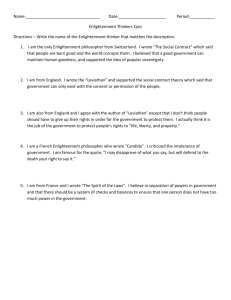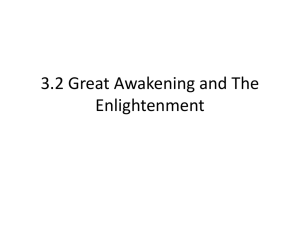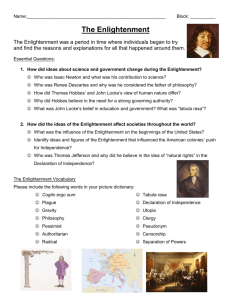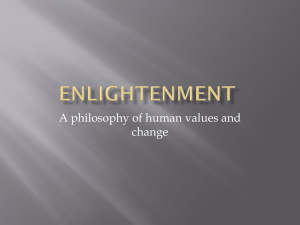Scientific Revolution and Enlightenment
advertisement
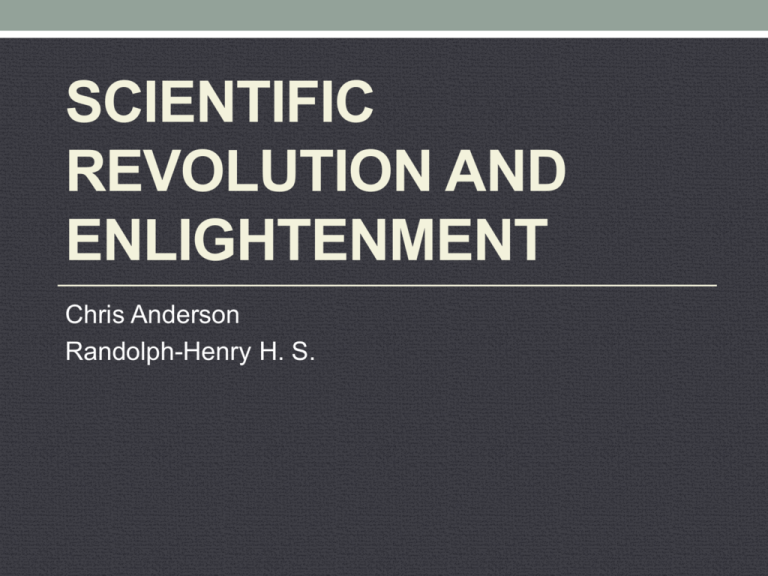
SCIENTIFIC REVOLUTION AND ENLIGHTENMENT Chris Anderson Randolph-Henry H. S. • During the Middle Ages science was based on Magic Mystery What the Ancients had written • Most scientific theories were outdated: • Believed Earth to be flat • Earth was the center of the universe • Science began to change in the 1600s • New technology developed (microscope and telescope) Astronomy • 1.) Nicolaus Copernicus: • Polish astronomer • Worked at University of Krakow in 1492 • Believed earth to be round • Heliocentric view of universe • Believed the ______________to be center of the universe • Never proved his theory • Since he was Catholic, he did NOT publish his ideas Nicolaus Copernicus • 2.) Johannes Kepler: • Skilled mathematician • Used math to prove that the Earth travels around Sun • Also proved the other planets travel around the sun • Planets use elliptical orbits—not circular • Although Protestant, still afraid to publish Johannes Kepler • 3.) Galileo Galilei: • 1609: created his telescope • Discovered moons around Jupiter (Galilean Moons) • Proves that a body can travel around another body • 1632: Published his ideas • Catholic Church did NOT like his book • He was placed on trial • He recanted his ideas even though he knew he was right • Placed under house arrest for the rest of his life • Continued to work in science • Created the Universal Laws of Physics Galileo Galilei Philosophy • 1.) Francis Bacon: • English Philosopher • Information not based on proven fact should be thrown out • Believed in using the scientific method Francis Bacon • 2.) Rene Descartes: • French Philosopher and mathematician • Only way to reach truth is through reason • Invented analytic geometry • 3.) Sir Isaac Newton: • Physicist from England (tell story) • Believed in scientific method • 1687: wrote Mathematical Principles of Natural Philosophy • The book explained his ideas on gravity and universal gravitation (why the planets move) • Invented Calculus Sir Isaac Newton Biology, Medicine, Anatomy • 1.) Andreas Vesalius: • French medical student • Illegally dissected dead humans (tell story) • Contributed a lot to the study of anatomy Andreas Vesalius • 2.) William Harvey: • English doctor • Discovered how blood circulates through the body • 3.) Robert Hooke: • Englishman • Discovered the _________________ • Used the microscope to make his discovery • What type of material did he look at to make his discovery??? Robert Hooke Chemistry • 1.) Robert Boyle: • Irishman • Turned chemistry into a pure science (tell story about alchemy) • Defined element—any substance that cannot be broken down into smaller parts Robert Boyle • 2.) Joseph Priestly: • English chemist and preacher • Studied air • Discovered Oxygen • Discovered carbon dioxide (CO2) • What did his discovery of CO2 help to develop???? Joseph Priestly Studies on Oxygen • 3.) Antoine Lavosier: • French Chemist • Studied Oxygen • Burning objects consume oxygen—Nature of Combustion IMPACT OF SCIENCE • Common people in Europe became interested in science • Began conducting scientific experiments at home • People began to believe that everything could be explained by using the scientific method (law, politics, economics, social relationships, etc.) Thomas Hobbes: • Believed that an absolute monarchy was the best form of government • Without an absolute monarch, a nation would fall apart • Believed humans are naturally inclined to become violent and disorderly (discuss) • Believed people do NOT have the right to rebel against the government • 1651: wrote Leviathan about a fictional place without a government Thomas Hobbes John Locke: • Believed the government should be based on a contract and order needed to be established (What type of contract???) • Believed humans to be naturally moral and reasonable (Who was right??) • People have rights to: • Life • Liberty • Property Ever heard of these before??? • Believed people COULD rebel against their government if the government took away their rights • 1690: wrote Two Treatises of Government • Lots of people in the American colonies read Locke’s book • Used Locke’s ideas as the basis for the American Revolution • Jefferson used Locke’s ideas in the Declaration of Independence John Locke Hugo Grotius • Dutch jurist • Wanted international law to be based on natural law William Penn • Founded the Quaker Colony in Pennsylvania • Pacifism Deism • Religious philosophy that says no one religious philosophy is true • Do not believe in organized religion • Very popular in America and Europe • Most of America’s founding fathers where deist TRIUMPH OF REASON Age of Enlightenment • Occurred during the late 17th and 18th centuries • People see the world as they have never seen it before • Classification of animals, insects, and plants • See the universe as a machine with fixed laws Philosophes (Philosophers) • Thinkers of the Enlightenment • Believe in Locke’s and Newton’s ideas • Dislike superstition • Like freedom of speech and people’s right to liberty • Wrote lots of books • France—active center for the Enlightenment • Salons—places where thinkers would gather to share ideas • Madame de Pompadour—famous French lady who ran a popular salon in Paris Madame de Pompadour Encyclopedie • The most important accomplishment of the Enlightenment • Published in 1751 • 28 volumes about everything known in the world (3000 pages long) • Started as a French translation of an English _____________________ • Denis Diderot—editor of Encyclopedie • Goes to prison defending the work Denis Diderot Montesquieu (Charles-Louis de Secondat, Baron de Montesquieu) • Helped Diderot with the Encyclopedie • 1748: wrote Spirit of Laws • Liked England’s government • Believed in 3 branches of government equally sharing power • 1.) Legislative • 2.) Executive • 3.) Judicial Ever heard of these??? • Believed in Individual rights • His ideas are present in the U. S. Constitution Montesquieu Voltaire (Francois Marie Arouet) • French writer and deist • Most famous work=Candid • Believed in separation of Church and State • Served 2 prison terms in the Bastille (tell story) Voltaire Enlightened Despots • Many monarchs attempted to use Enlightenment ideas in their nations • Trying to promote industry, agriculture, culture, and education • 1.) Frederick II (Prussia) • Abolished torture • Created elementary schools (Why????) • 2.) Maria Theresa (Austria) • Wanted to free the serfs, but did not • Created elementary schools • 3.) Joseph II (Austria) • Maria’s son • Abolished serfdom • Equal tax for all • Freedom of press All his reforms fail because the Church and nobles force him to repeal all of the reforms. WHY?? Art/Music/Literature • Enlightenment ideas will affect the arts • Palaces/museums constructed • Artists created works that were calm and rational • Works appeal to the mind, not the eye • Music was also transformed • Music created for pleasure, not the Church • Composers stressed balance, contrast, and refined emotion • 2 new inventions—piano and violin Bach, Toccata and Fugue in D minor, organ - YouTube Other Views • Not all people agreed with the Enlightenment • Thought it was too rational—not enough emotion • 1.) Jean-Jacques Rousseau: • Criticized the Enlightenment • Unhappy guy • Had physical/mental problems • Believed most people were naturally good • Civilization (cities) made people bad • Said all people should go live in the country and become closer to nature • Believe in Locke’s ideas (power resting with the people) Rousseau • 2.) Immanuel Kant: • Metaphysics—philosophy that deals with universal, spiritual, and eternal questions— all are real even though science cannot explain them • 1781: wrote Critique of Pure Reason • Said religion, beauty, and morality were real even though they could not be explained by science Immanuel Kant • 3.) Count von Zinzendorf: • Created the Moravian Brethren • Stressed the emotional and mystical side of Christianity (miracles) • 4.) John Wesley: • Created Methodism (Methodist Church) • Stresses the value of the personal religious experience • Eventually, the Enlightenment will be replaced by Romanticism • A new movement that stresses emotion and the individual


